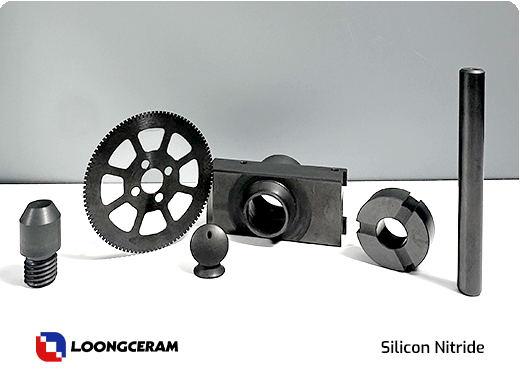Silicon Carbide SiC
Silicon Carbide (SiC)
Silicon Carbide (SiC) is one of the lightest, hardest, advanced ceramic materials and has exceptional thermal conductivity with resistance to temperature / acids, and has a low thermal expansion. Silicon Carbide is an excellent material to use when wear is an important consideration because it exhibits good sliding, erosion and abrasive resistance, making it useful in a variety of applications such as seal rings, nozzles, and hydro cyclone components. Silicon carbide materials are electrically conductive and this may be helpful for resistive or inductive heating, dissipating charge etc. There are several Silicon Carbide grades available; sintered, reaction bonded, free carbon, composite, with relative advantages depending on the application and the size / shape required.

Material Advantages
- Extremely high hardness
- Wear-resistant
- Corrosion-resistant
- Lightweight – Low Density
- High thermal conductivity
- High Young’s modulus
- Low thermal expansion coefficient
- High temperature material
- Excellent thermal shock resistance
Material Properties
Mechanical Properties
Thermal Properties
Electrical Properties
| Property | Units | CeramaSil-C |
|---|---|---|
| Density | g/cm3 | 3.1 |
| Hardness | GPa | 28 |
| Flexural Strength @ 25°C | MPa | 410 |
| Poisson’s Ratio | – | 0.14 |
| Fracture Toughness KIc | MPa m1/2 | 4.60 |
| Property | Units | CeramaSil-C |
|---|---|---|
| Thermal Conductivity @ 25°C | W/mK | 102.6 |
| CTE1 @ 25°C ➞ 400°C | 10-6/K | 4.02 |
| Maximum Temperature (Inert) 2 | °C | 1900 |
1 Coefficient of Thermal Expansion (CTE) describes how the size of an object changes with a change in temperature.
2 No load.
| Property | Units | CeramaSil-C |
|---|---|---|
| Volume Resistivity @ 25°C | ohm-cm | 102-1011 |
| Volume Resistivity @ 1000°C | ohm-cm | 0.01 – 0.2 |
Disclaimer: The values presented are mean and typical of those resulted from test samples. They are provided as an indication only to serve as guidance in the design of ceramic components and are not guaranteed in any way. The actual values can vary according to the shape and size of the envisioned component.
Silicon Carbide Machining
Silicon carbide can be processed in a green, raw, or fully dense state. In the raw or billet state, it can be relatively easily processed into complex geometric shapes. However, the sintering process required to fully densify the material will result in a shrinkage of approximately 20% in the silicon carbide body. This shrinkage means that very strict tolerances cannot be maintained when processing silicon carbide before sintering. In order to achieve very strict tolerances, diamond tools must be used to process/grind fully sintered materials. During this process, very precise diamond coated tools/grinding wheels are used to grind the material until the desired shape is formed. Due to the inherent toughness and hardness of the material, this may be a time-consuming and costly process. Like oxides and nitrides, silicon carbide is a highly wear-resistant material that requires diamond grinding for processing after sintering.
Product application
Within the current range of advanced ceramics available from Precision Ceramics are two of the hardest materials known to man. Only surpassed by diamond itself, Boron Carbide and Silicon Carbide over the years have earned the distinguished title of “Super Hard Ceramics”.
Classified by purity
Forming method
- Injection Molding+